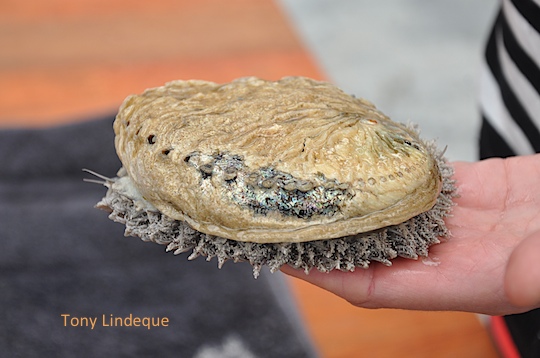The NSRI recently assisted the occupants of a 5.5 metre rubber duck (for scale, almost a metre shorter than Seahorse, which is rated for seven passengers and a skipper) when their single engine failed off Gansbaai. There were eleven divers on the boat, and it was 11.30 pm when they were rescued. The NSRI report of the incident specifically states that the divers were “recreational”, but it is highly likely that they were poachers, illegally harvesting abalone or possibly rock lobster.
The NSRI report was shared on a number of facebook pages maintained by members of the local scuba diving community (including ours). One comment thread in particular, in one of the groups where the report was shared, made me very sad. Multiple commenters suggested that the NSRI should have left the poachers out at sea to be eaten by sharks, and there was even distasteful speculation about the race of the men who were rescued. It’s very easy, on the Internet, to write that you think someone should be abandoned to die, or that they deserve it – but that doesn’t make it a right sentiment. The speed at which we get updates on social media make it easy for us to fail to engage with the nuances of events and situations, and rather to pass swift judgments and wish death on some mother’s child.
This is what the NSRI says about themselves:
Sea Rescue is the charity that saves lives on South African waters. Our crews put their lives at risk in order to save the life of a stranger. They will voluntarily go to sea in the worst conditions, to help anyone in need.
Nothing there suggests that they will first pass judgment on the activity you’re engaged in, or on how wise you were to go out in such bad sea conditions, and then decide whether to assist or not!

Fisheries management in South Africa has been performed with aggressive incompetence for the past five or more years, with a focus – by the authorities – on personal enrichment and the fruits of corruption. (If you want to learn more about this, I suggest you read the whole of the Feike Management blog, and then start making serious plans to get off the grid, given that the former minister of fisheries is now brokering nuclear deals with that global pariah, Russia.) Management of our abalone stocks has been done on the basis of wishful thinking and illegality.
The communities whose young men choose poaching as a career are poverty-stricken and in many cases beneficiaries of laughably small quotas to catch stocks of fish that no longer exist. It is an economic choice for them, borne of desperation, and often the men who harvest the resource only get a fraction of the ultimate monetary value of the product. An article in the Mail & Guardian by Kimon de Greef, who studied abalone poaching for a Masters degree in conservation biology, explains the economics of the process:
He explained his poaching work as we sat amid the plants and the Rasta, whose name was John, continued preparing his spliff. David told me he skippered a boat for a white diver who had relocated to Hout Bay to target reefs on the Cape Peninsula. Another local diver – whom by chance I’d already interviewed – worked with them, as well as a bootsman, or deck assistant.
The divers paid David R20 a kilogram of perlemoen they harvested; the bootsman earned half as much. The divers also hired carriers to run their catch to middlemen in the community, who paid prices of between R200 and R250 a kilogram. These middlemen sold the product on to buyers from larger criminal syndicates, who ultimately controlled the illicit trade to the Far East.
On a good night, after expenses, the two divers could earn R10 000 each, with David taking home R4 000.
As scuba divers, we tend to see this issue quite simply: someone is illegally taking beautiful, unique creatures out of the ocean! We forget that the communities engaged in these activities are far less privileged than we are, and that this is a complicated, historically fraught issue that won’t be solved by leaving a boatload of poachers to be swept out to sea in the dark of night.
I suggest you read de Greef’s article. It humanises the poachers – puts faces on them – and helps to tease out some of the more complex issues at play regarding this valuable marine resource. Johnny Steinberg did a comprehensive and more detailed review of the illicit abalone trade some years ago, which is a longer read if you’ve got time.
Read the M&G article here.







